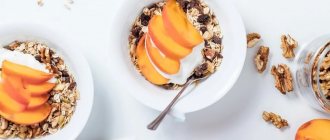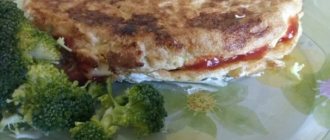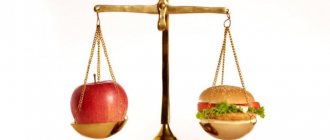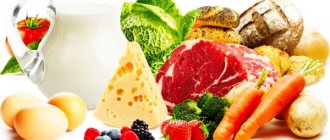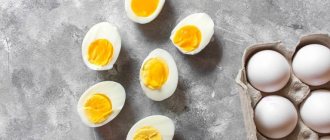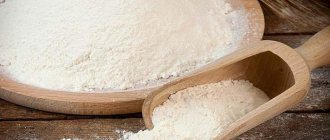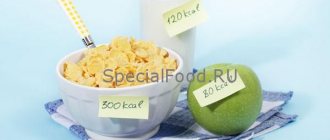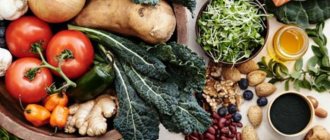Useful properties, composition
Almost all types of eggs can be eaten, but chicken eggs are the most popular and in demand due to their low calorie content.
Daily use 1 pc. A boiled egg will allow you to get the necessary vitamins, macro- and microelements.
Eating a product can be beneficial or harmful, which largely depends on the person’s health status and the number of eggs eaten. Nutritionists and doctors do not recommend eating more than 2 eggs per day.
The egg contains many vitamins A and B, biotin, choline and other elements.
The benefits of eating eggs are associated with their beneficial effects on the functioning of the whole body:
- the state of the nervous system is normalized;
- oncological diseases are prevented;
- has a beneficial effect on mental development by improving the nutrition of brain cells;
- liver performance is normalized;
- the balance of hormones in men is stabilized;
- toning of the walls of blood vessels occurs;
- the body's resistance increases, immunity increases;
- 1 egg with a low calorie content, which is boiled, can reduce the feeling of hunger due to the selenium content in it.
The egg contains many vitamins A and B, biotin, choline and other elements.
Possible harm from consuming the product is associated with the following points:
- significant cholesterol content;
- possibility of salmonella infection;
- in case of diabetes mellitus, consuming the product doubles the risk of heart attack;
- danger of allergic reactions.
Due to the potential danger of allergic reactions in children, there are a number of age restrictions. Yolk is allowed to be introduced into a child’s diet from 9 months, white only at 2 years.
Macroelements contained in 1 egg in mg:
- sodium (134);
- chlorine (156);
- potassium (140);
- sulfur (176);
- magnesium (12);
- phosphorus (192).
The composition also contains a large number of microelements in mcg:
- chromium (4);
- iron (2.5);
- molybdenum (6);
- iodine (20);
- copper (83);
- manganese (0.29);
- selenium (31.7);
- zinc (1.11);
- fluorine (55);
- cobalt (10).
Eggs in dietary nutrition
Nutritionists often recommend eggs in diet menus. They are rightfully classified as low-calorie and healthy products. In addition to diets, they are also prescribed in the therapeutic nutrition menu. Thanks to their consumption, metabolic processes are normalized. Moreover, those who prefer to eat 2 boiled eggs for breakfast ensure that they feel full for a long time. This also reduces the daily diet by about 300 kilocalories.
Practical advice: For those who want to lose excess weight, nutritionists recommend eating at least 2-3 eggs per week. In low-carbohydrate nutrition programs, their number increases to 4-5.
When cooked, they can improve the body’s protective functions and also provide a sufficiently nutritious diet. They can be seen on the menu of many popular and effective diets, in particular the Kremlin, protein, Atkins and Protasov.
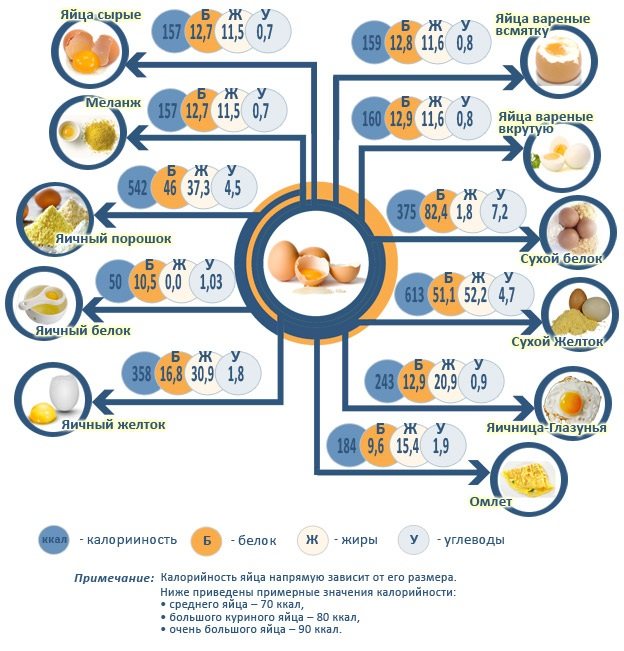
Chicken egg calorie content per 100 grams
There is a classification of eggs into categories depending on their weight. An egg weighing 100 g is considered large and belongs to the highest category. A stamp with the letter “B” is placed on the package or egg.
The calorie content of an egg may vary slightly depending on the cooking method. For example, for 100 g of raw egg the calorie content is 157 kcal, and for 1 pc. boiled egg - 158.7 kcal. At the same time, the energy indicators of protein and yolk at the same weight differ significantly.
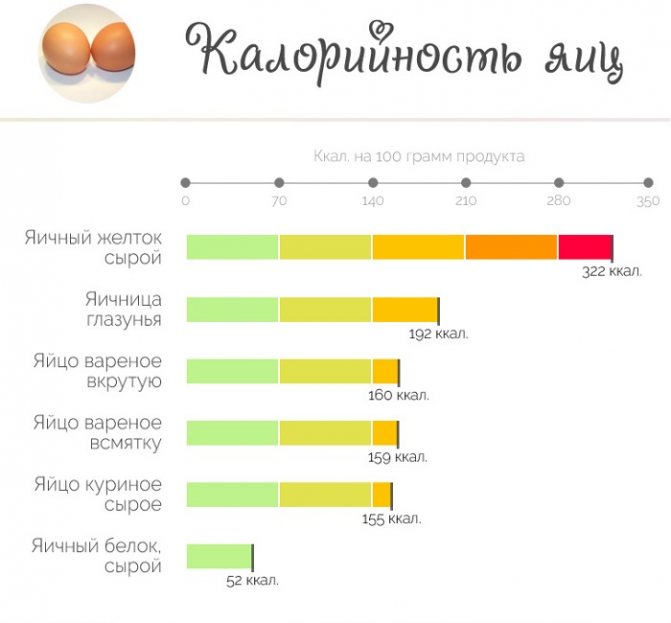
Egg calorie content 1 pc. (boiled) - 64.5 kcal.
In most cases, recipes indicate the required number of eggs. It is worth considering that in cooking the mass of 1 egg is equal to 40 g.
Calorie content of 1 piece of raw chicken egg with an average weight of 70 grams
An egg weighing 70 g is considered large and belongs to the selected category. In this case, the letter “O” is placed on the egg or on the packaging. The calorie content of a raw egg is 110 kcal.
How many calories does the raw white of one chicken egg contain?
The main component of protein is water, the percentage of which reaches 85%. In addition to water, it contains fats and carbohydrates, so the calorie content of 100 g of protein is on average 50 kcal.
This indicator is directly affected by its weight. With a total egg weight of no more than 70 g, the protein weight is usually 33 g with a calorie content of 18 kcal.
How many calories does the raw yolk of one chicken egg contain?
The calorie content of the yolk is significantly higher than that of the white. 100 g of product contains 358 kcal. The average weight of a regular yolk is 18 g. Simple calculations show that the calorie content of 1 egg is 1 pc. (boiled) - 64.5 kcal.
Calories in cooked eggs
When cooking, the calorie content of the product remains virtually unchanged. The type of egg obtained after boiling depends on the duration of the thermal treatment of the product. The shorter the cooking time for the egg, the thinner its consistency will be.
Calorie content of one cooked (boiled) egg
When an egg is boiled, its calorie content remains virtually unchanged. The maximum caloric value with this method of preparation does not exceed 158 kcal.
Boiled egg white calorie content
The calorie content of boiled protein per 100 g practically does not change during cooking. The calorie value may vary slightly depending on the place of production and in most cases does not exceed 50 kcal.
The need to consume only protein may be related to the characteristics of the human body or the requirements of the egg diet.
After protein separation, control weighing is performed on scales. Next, the calorie content of the resulting amount is calculated by multiplication, and, if necessary, adjusted downwards or upwards.
Boiled egg yolk calories
The calorie content of boiled yolk per 100 g is 218.48 kcal. This value may vary slightly, since the quality of the egg depends on the place of its production.
Calorie content of soft-boiled eggs 1 piece
The consistency of a soft-boiled egg depends on the cooking time. The longer the cooking time, the denser the consistency of the internal contents of the egg.
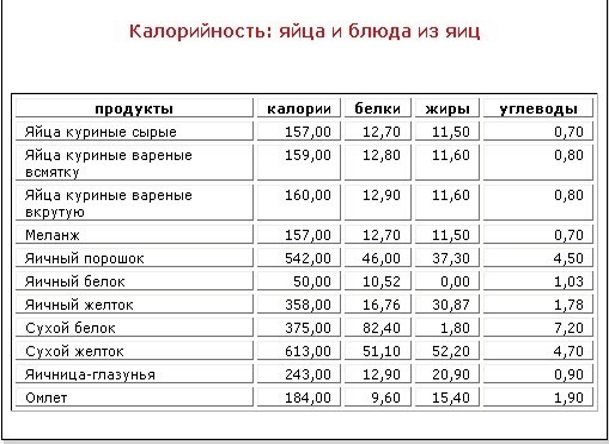
Cooking time has virtually no effect on the final calorie content of the product, so the calorie content of a soft-boiled egg corresponds to that of a raw egg and is 158.7 kcal.
Calorie content of hard-boiled eggs 1 pc.
The calorie content of a hard-boiled egg is practically no different from a cooked soft-boiled one. The maximum increase can reach 5 kcal. The average cooking time for a hard-boiled egg is 7 minutes.
The longer the egg is cooked, the more the calorie content increases, but this increase is very insignificant.
Poached egg: calorie content
This method of preparing the dish first appeared in France and today the recipe has become popular all over the world.
The essence of the cooking method is to cook the egg in practically non-boiling water. To give a rich taste, it is recommended to add a small amount of vinegar to the water.
The density and consistency of a dish largely depends on the cooking time, which only affects the appearance, but does not affect the calorie content of the food.
Cooking for 3 minutes will result in a creamy yolk. When cooked for 5 minutes, you can get a poached egg with a denser structure.
The calorie content of 100 g of egg using this method of preparation is 159 kcal.
Calorie content of egg whites and yolks
An egg can clearly be divided into two parts: the white and the yolk. Their composition differs radically in the content of proteins and fats, as well as calories and microelements. Those who use eggs for weight loss need to know these differences. The yolk is rich in complete animal proteins, fat and cholesterol. It contains about 11.5% fat. Cholesterol in one yolk is 210 mg. Of course, those who struggle with atherosclerosis are forced to almost completely abandon egg yolk. But if you do not have significant problems with blood vessels, then you should not completely abandon this product. The yolk contains a lot of useful substances: omega-3 complex, calcium, folic acid, vitamin D. The calorie content of each chicken egg yolk is approximately 55-65 kilocalories. Protein has completely different nutritional properties. It consists of carbohydrates and proteins (albumin). Protein contains virtually no fat or cholesterol, which means it will not be harmful even with the strictest diet. In terms of energy value, this product can be classified as low-calorie. The calorie content of egg white is only 15-20 kilocalories. If we talk about 100 grams of product, then the calorie content for the yolk is 352 kilocalories, and for the white it is only 45 kilocalories.
Calorie content of 1 fried egg
The calorie content of an egg prepared by frying can increase significantly. The final calorie content of a dish is affected by the frying method, so the increase may be minor or more significant.
With sunflower oil
The use of even a small amount of oil leads to a significant increase in the calorie content of the finished dish. 100 g of sunflower oil contains up to 900 kilocalories.
When fried with oil, the calorie content of an egg increases by about 30%. On average, the calorie content of such a dish is 200 kcal.
Regular scrambled eggs can contain up to 240 kcal. Due to their high calorie content, such dishes are not recommended to be included in the diet.
No oil
Frying without oil will keep the calorie content close to that of a boiled egg. When simply frying an egg without using oil, the calorie content is 174.6 kcal.
Calorie content of an omelet (fried egg) from one egg
In our country, the traditional fluffy omelette is the most popular. The splendor of the dish and the richness of its color are influenced by the cooking time and the presence of accompanying ingredients in the form of milk and salt. On average, the calorie content of a traditional omelet is 184 kcal.
Very often, those losing weight use a small trick to reduce the calorie content of a dish. Its essence is that only protein is used for the omelet. This omelet turns out to be white, very airy and significantly less caloric. 100 g of protein omelet contains 55.7 kcal.
The traditional method of making an omelet involves beating eggs with milk and adding a small amount of salt.
The calorie content of an egg may vary slightly depending on the cooking method. For example, for 100 g of raw egg the calorie content is 157 kcal, and for 1 pc. boiled egg - 158.7 kcal.
This mixture is fried in a frying pan with a small amount of oil until a characteristic yellowish tint is obtained.
There are a number of ways to reduce the calorie content of a dish:
- adding a small amount of water instead of oil;
- cooking using a microwave;
- simmering in a double boiler.
When using such cooking methods, you can significantly reduce the final calorie content, which will ultimately be the sum of the calorie content of the products used.
With milk
The nutritional value and calorie content of an omelet using milk is largely influenced by the fat content of the dairy product. In most cases, the omelet is prepared using a dairy product with a fat content of 2.5-3.2%.
For those losing weight, the ideal option is to prepare an omelet using skim milk.

Today there are many recipes for making omelettes, which contain other ingredients in addition to milk.
Calorie content of the most popular omelettes with milk:
- with tomatoes (162 kcal);
- with the addition of cheese cooked in vegetable oil (345 kcal);
- without other ingredients, steamed (136 kcal);
- only from proteins, cooked without oil (55.7 kcal).
To calculate the calorie content in an omelet, it is worth remembering that the final value depends on the base. One egg contains about 157 kcal, milk with a fat content of 3.2% contains 59 kcal.
When fried in butter, 100 g of the finished omelette will contain 128 kcal. Reducing the fat content of milk, using exclusively protein, replacing butter with vegetable oil will help reduce the overall calorie content of the dish.
With tomatoes
Tomatoes give the omelette an unusually rich taste. The number of ingredients and their ratio in the finished dish may vary; the calorie indicator in an omelet depends on their content and ratio. 100 g of traditional omelette with tomatoes contains 99.95 kcal.
With cauliflower
100 g of cauliflower contains 120-150 kcal. The use of such an ingredient allows you to achieve a special taste of food.

A significant part of the recipes contains the following ingredients:
- eggs;
- cauliflower;
- onion;
- milk.
100 g of omelette with cauliflower contains 58.2-94 kcal. The indicator depends on the ratio of ingredients and the amount of oil used.
Cooking in the microwave or oven does not require the use of oil, and therefore the calorie content of food with such cooking methods will be minimal.
Which is better, white or yolk: heat treatment rules
All the beneficial substances contained in the yolk are preserved only if it is fresh. That is, raw. However, in most cases, people cook, fry, and boil eggs.
How to preserve the benefits of eggs? To do this, it is necessary to resort to certain methods of heat treatment. It is best if the white is boiled and the yolk is liquid and fresh. Therefore, the ideal option would be to prepare fried eggs or poached eggs.
Which is better, white or yolk, does not matter if you boil eggs soft-boiled or in a bag. This way, you will be able to boil the white, but the yolk will remain liquid. This will help preserve the beneficial properties, vitamins, minerals, and fatty acids found in the yolk.
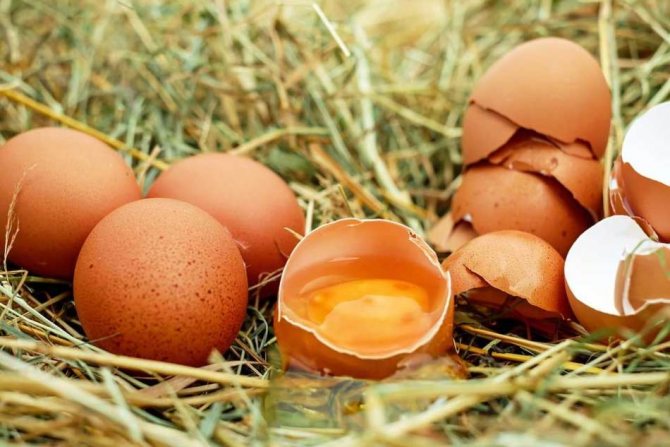
Homemade eggs
It is best to eat a balanced diet and limit the consumption of fat and smoked foods. It is this food that becomes a source of bad cholesterol.
Quail egg calorie content per 100 grams
Compared to chicken eggs, the calorie content of a quail egg is slightly higher. The calorie content of 100 g of product is equal to 168 kcal. On average, the weight of 1 egg does not exceed 9-10 g, so its calorie content is 14 or 16 kcal.
In terms of mineral content, quail eggs are somewhat inferior to chicken eggs, however, the content of some elements in such a product is several times higher. For example, there is 3 times more magnesium in a quail egg.
It is this element that is responsible for stable operation:
- nervous system;
- blood supply systems;
- calcium and cholesterol metabolism.
The iron content in a quail egg is significantly higher than that in a chicken egg, so their consumption has a beneficial effect on the blood supply and improves metabolic processes at the cellular level.
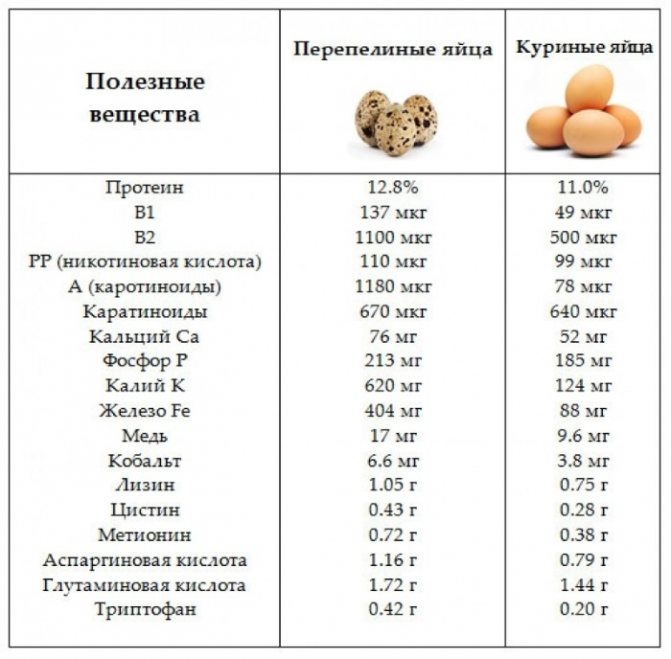
The vitamin A content in such an egg is almost 3 times higher than in chicken eggs.
Quail eggs can also vary in size and shape, so the calorie content is 1 pc. raw or cooked product may differ.
Calorie content depends on the method chosen for preparation.
Calorie content of the product:
- raw nutritional value - 168 kcal;
- egg calorie content 1 pc. (boiled) - within 160 kcal;
- calorie content of fried without oil - 185 kcal.
Calorie table for eggs and dishes made from chicken and quail eggs per 100 grams
For those losing weight and people controlling their weight, it is important to create a program in such a way as to ensure the effect of losing weight by reducing the calorie content of food, without sacrificing the quality and content of vitamins and elements in it.
Today it is not difficult to calculate the calorie content of a dish on your own, since there are many tables with information about the calorie content of egg dishes and online calculators.
The final calorie content of a dish largely depends on the proportions of the main ingredients and their nutritional characteristics.
Let's present a table of the calorie content of eggs and the most popular dishes using them per 100 g:
| Eggs, kcal | |
| Raw chicken egg | 157 |
| Raw quail egg | 167 kcal |
| Boiled chicken egg | may differ slightly from the calorie content of raw |
| Boiled quail egg | |
| Egg dishes, kcal | |
| Scrambled eggs with butter | 240 |
| Scrambled eggs without butter | 174,6 |
| Classic omelette | 184 |
| Steamed omelette without other ingredients | 136 |
| Egg white omelette without vegetable oil | 55,7 |
| Omelet with tomatoes and milk | 162 |
| Omelet with cheese | 343 |
| Omelet with milk, cheese, vegetable oil | 345 |
| Omelette with mushrooms and chicken | 211 |
| Omelette with meat ingredients | 350 |
The daily norm for a healthy person is considered to be consuming 1,200–1,600 kcal per day. This norm depends on the lifestyle, nature of work, gender, and individual characteristics of a person.
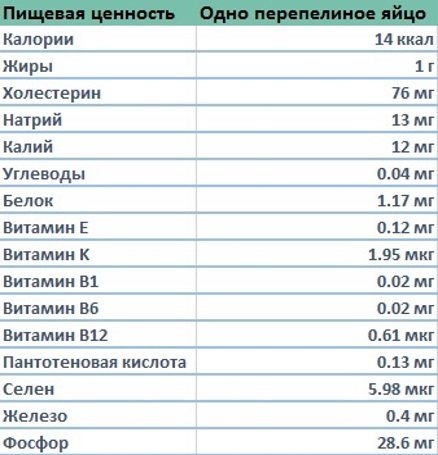
Having information about the approximate calorie content of dishes or having calculated this value independently, everyone has the opportunity to adjust their daily diet.
Egg diet for 7 days: menu
A diet based on the benefits of eggs is considered one of the most effective weight loss systems. The main ingredient is the egg. Calorie content 1 pc. (boiled egg) must be counted correctly.
The effectiveness of the diet is associated with its unique properties, because an egg can provide a person with a sufficient amount of essential substances, including vitamins.
Vegetables and fruits are allowed for consumption ; fermented milk foods are used to maintain intestinal microflora. The exception is those products that do not contribute to weight loss.
Prohibited:
- potato;
- grape;
- date fruit;
- figs;
- banana.
Due to the acidity of citrus juice, the volume of the stomach decreases.
When following the diet, you need to eat three meals a day and avoid additional snacks.
The advantage of this method is:
- lack of hunger;
- ability to provide dietary diversity;
- no need to take a complex of vitamins;
- there is a small probability of stress or depression due to restrictions.
Before you begin, you should assess all possible risks and your own capabilities in advance. This diet is not suitable for people with an allergic reaction to citrus fruits or problems with the functioning of the digestive system. The diet is contraindicated during pregnancy and lactation.
It is worth considering that if a person has previously had no allergic reactions to citrus fruits or eggs, then during a period of dietary restriction side effects may occur:
- allergy;
- dizziness;
- weakness.
Such symptoms are natural and usually go away when the body gets used to the unusual regime.
The list of certain products acceptable for consumption during the day is regulated.
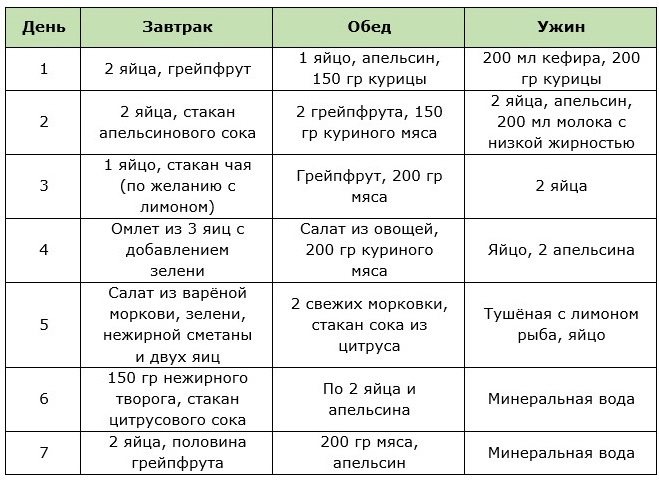
A weekly diet is more gentle, but the effect of a longer diet will be more significant. Restricting your diet in compliance with all the rules will allow you to get rid of 3 to 4 kg in one week.
When preparing, you must adhere to a number of requirements:
- the egg is not cooked until hard;
- oil in vegetable stew is strictly unacceptable; it is replaced with lemon juice;
- instead of orange you can take grapefruit;
- only lean meats are used;
- The skin is removed from the chicken.
Menu program for 7 days:
| In the morning | During the day | In the evening | |
| Mon. | orange, 2 eggs | 1 egg, 1 citrus, 150 g chicken | 1 cup low-fat kefir, 200 g chicken |
| Tue | 2 eggs, tea | 2 citrus, 150 g chicken | 2 eggs, 1 citrus, 1 glass of low-fat milk |
| Wed. | 1 egg, citrus, juice | 1 citrus, 200 g lean meat | 2 eggs |
| Thu | 3 egg omelet with herbs | 1 citrus, 200 g lean meat | 1 egg, 1 citrus |
| Fri. | boiled carrots, 2 eggs, low-fat sour cream, greens | 2 carrots, 1 tbsp. citrus. juice | stewed fish, 1 egg |
| Sat. | 150 g low-fat cottage cheese, 1 tbsp. citrus. juice | 2 eggs, 2 citrus | mineral water |
| Sun. | half a citrus, 2 eggs | 200 g lean meat, 1 citrus | mineral water |
By adhering to such a diet, there is no strong stress due to food restriction and the need to starve, since each meal is varied and sufficient to relieve hunger, and you can lose several kilos with it.
Composition of chicken yolk and protein
Chicken yolk composition:
- Omega-3 and omega-6 acids. That is why some vegetarians who do not eat meat and fish introduce large amounts of eggs into their diet. After all, consuming 4 yolks can completely cover the body’s consumption and need for these acids.
- The yolk contains a lot of fat-soluble vitamins, such as B vitamins. These are B1, B12, B6. All these components have a positive effect on the condition of the skin and strengthen the walls of blood vessels.
- However, if they are taken without accompanying substances, they are poorly absorbed in the body, since they are fat-soluble. That is why consuming yolk is an ideal option that will facilitate the absorption of beneficial vitamins.
Chicken protein composition:
- The vitamins contained in protein are presented on their own, that is, without fat. They are the same as in the yolk: B1, B12, B6.
- Accordingly, the absence of omega acids in protein means that beneficial elements will be washed out of the body, and those that come with food will not be absorbed.
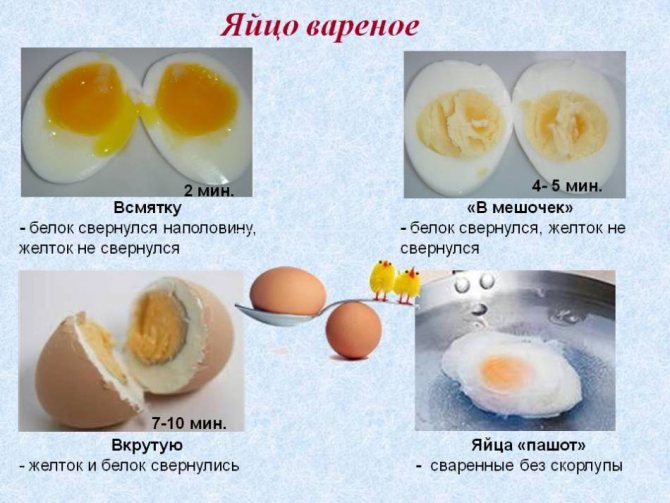
Options for cooking eggs
Egg diet for 2, 4 weeks
The duration of such diets is longer and therefore requires significant willpower. The requirements for preparing basic foods for daily consumption are similar to the seven-day diet.
Meals for 14 days
For the entire time of dietary restrictions, the morning meal is always 0.5 citrus fruit and no more than two eggs . The instruction on the use of fruit means that you need to choose from acceptable fruits: apple, pear, watermelon, plum.
The iron content in a quail egg is significantly higher than that in a chicken egg, so their consumption has a beneficial effect on the blood supply and improves metabolic processes at the cellular level.
Vegetable stew can be tomato-cucumber, pepper or carrot based, no oil is added. Any meat should not be fatty; it can be boiled, baked, cooked using a double boiler or in the microwave.
The use of any oil with such a diet is unacceptable.
The program is for 14 days. The lack of an exact volume of product means that there are no strict restrictions.
| Food Time | First 7 days | Days 8 to 14 | |
| Day 1 | during the day | fruit | meat, vegetable stew |
| In the evening | meat 200 g | 2 eggs, vegetable stew, 1 citrus | |
| Day 2 | during the day | chicken | meat, vegetable stew |
| In the evening | vegetable stew, 2 eggs, a small piece of soft bread, 1 citrus | 2 eggs, vegetable stew, 1 citrus | |
| Day 3 | during the day | low-fat cheese, tomato, 1 toast | cucumber, meat |
| In the evening | meat 200 g | 2 eggs, vegetable stew, 1 citrus | |
| Day 4 | during the day | fruit | low-fat cheese, 2 eggs, vegetables |
| In the evening | meat, vegetable stew | 2 eggs | |
| Day 5 | during the day | zucchini, carrots, beans, 2 eggs | lean boiled fish |
| In the evening | lean fish, vegetable stew, 1 citrus | 2 eggs | |
| Day 6 | during the day | fruit | 1 citrus, meat, tomato |
| In the evening | vegetable stew, meat | 1 citrus, meat, tomato | |
| Day 7 | during the day | zucchini, carrots, beans, 2 eggs | chicken, 1 citrus, tomato, boiled vegetables |
| In the evening | lean fish, vegetable stew, 1 citrus. | chicken, 1 citrus, tomato, boiled vegetables |
By adhering to the restrictions for 14 days, you can lose 4-7 kg.
